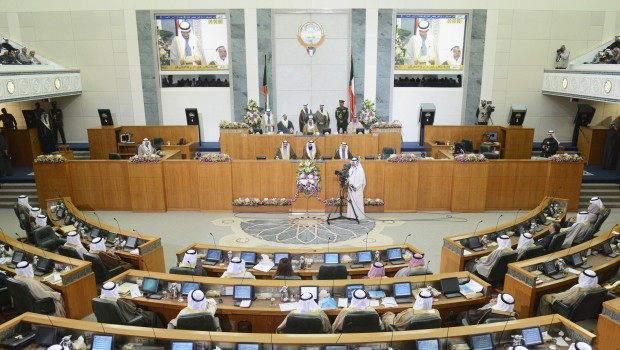
Emir Sheikh Sabah al-Ahmad al-Sabah (top C) attends the opening of the 14th session of Parliament in Kuwait City in this December 16, 2012 file photo (REUTERS/Stephanie Mcgehee/Files)
Following the meeting, Al-Rashid announced that the Emir had directed him to contain the political crisis that has gripped Kuwait since last week. After reports indicating that the cabinet has not made a decision on attending upcoming parliamentary session, Al-Rashid claimed, “Sheikh Sabah informed us that the cabinet will attend the parliamentary session scheduled for 28 May.”
Members of the cabinet have not appeared in parliament since early last week, when they submitted their resignation to the Prime Minister Jaber Al-Mubarak. Subsequent parliamentary sessions were canceled by the speaker as a result.
The latest breakdown in relations between the government and parliament began when five MPs submitted requests to question the ministers of Oil and the Interior.
The request ended a truce of sorts between the government and parliament, after both had agreed to postpone the questioning for six months, prompting ministers to tender their resignations.
The latest disagreement comes as Kuwaitis await the Supreme Court’s decision on the situation of the current parliament, which was formed in December after the dissolution of the former.
The Supreme Court will consider 68 appeals against the recent elections, including appeals against a decree approved by the Emir which reduced the number of votes each voter was entitled to cast, which prompted the opposition to boycott the parliamentary elections.
In a statement to the Kuwait News Agency (KUNA), Al-Rashid denied that the Emir had addressed the Supreme Court’s decision about the decree, which is to be considered on 16 June.
Al-Rashid said: “This is up to the Supreme Court and people will commit to respect the Supreme Court’s decision.”
